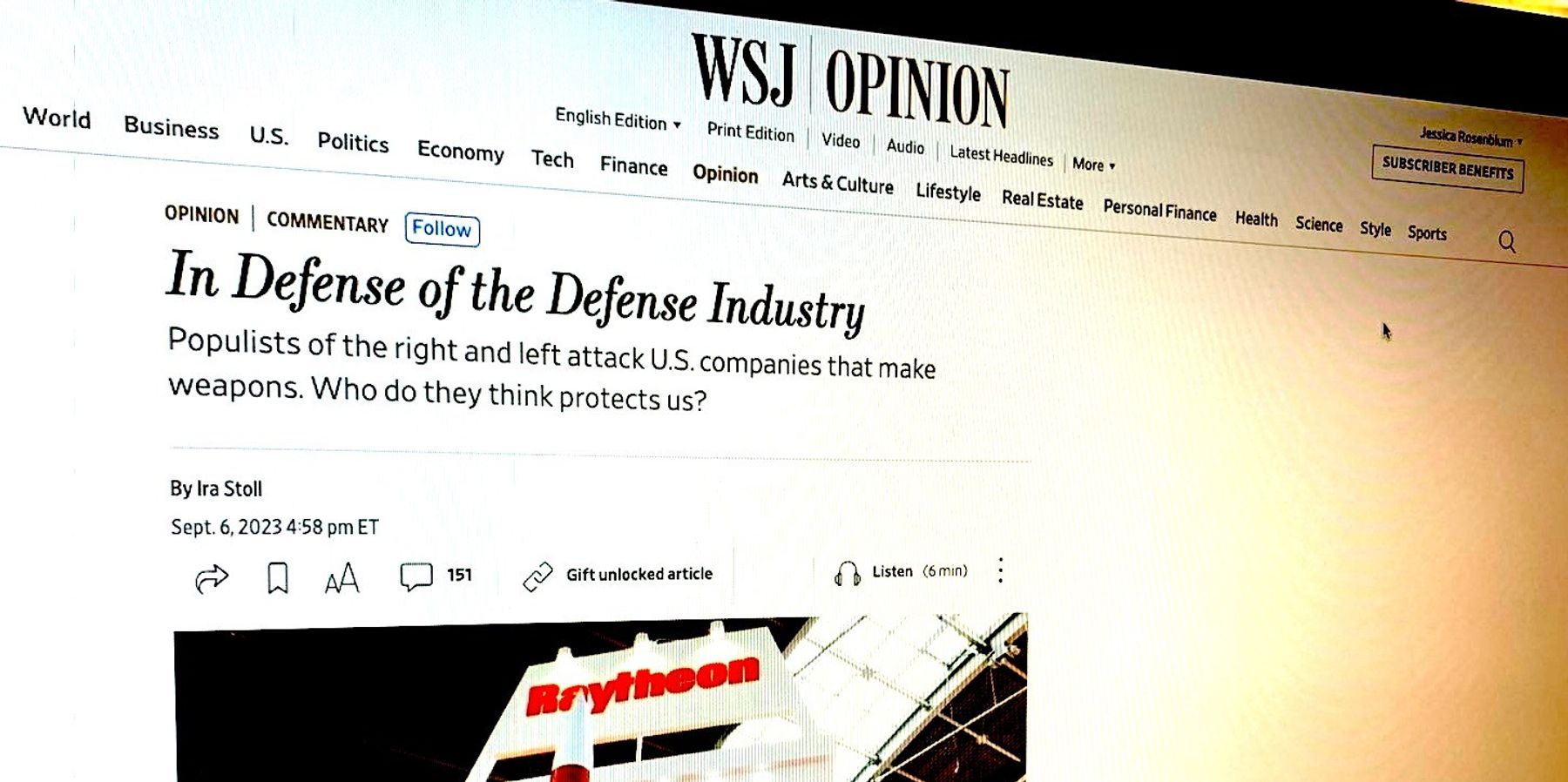It probably won’t surprise you to learn that the editorial page of the Wall Street Journal is not composed of a bunch of peaceniks who decry the crimes of the military-industrial complex at every opportunity. But a pro-industry op-ed it ran Thursday — entitled simply, “In Defense of the Defense Industry” — might as well have been written by the public affairs department of Raytheon. If anything, the Journal should be embarrassed for running it.
It’s a strange piece. Two-thirds of it describes efforts to protest or at least establish distance from the big weapons firms by everyone from protesting students at Harvard to officials of the Heritage Foundation to executives of major investment firms. The author, Ira Stoll, the editor of FutureofCapitalism.com, protests too much, lumping student activists demonstrating against Raytheon with a conservative think tank that has stopped taking arms industry money to avoid the appearance of a conflict of interest with firms like Black Rock that offer investment funds free of stocks in major weapons makers.
This is not exactly a unified front bent on dismantling the military-industrial complex, although any action that curbs the power and influence of the Raytheons and Lockheed Martins of the world is a welcome step.
When Stoll finally gets around to defending the weapons companies, he cherry picks cases where their systems have been used by U.S. allies like Israel and Ukraine. He conveniently forgets to mention how U.S.-supplied weapons have been used repeatedly to bomb and kill Palestinians, much less the role of U.S.-built bombs in attacking hospitals, water treatment plants, ports — even a school bus — in Yemen.
The truth is that arms executives — many of whom rake in tens of millions in compensation each year — are not so much immoral as amoral. If there’s business to be had, regardless of the character of the client, they’re there to sell their wares, no questions asked.
Perhaps the greatest irony of the article is that the head of an organization devoted to touting the blessings of capitalism is praising the least capitalist industry in America. The top five weapons contractors — Lockheed Martin, Raytheon, Boeing, General Dynamics, and Northrop Grumman — split well over $100 billion per year in Pentagon contracts, many of which were awarded without significant competition or basic standards of accountability.
In all, over half of the department’s $800-plus billion budget goes to private companies. These vast sums are secured in part through the work of the more than 800 lobbyists employed by the weapons industry, many of whom came from top jobs at the Pentagon. The industry may have its problems with cost overruns and performance issues with systems like the F-35 combat aircraft and the Littoral Combat Ship, but its ability to exert its influence to secure taxpayer money is unmatched.
The big weapons firms are better at making money than they are at producing affordable, effective systems. As a 60 Minutes investigation revealed earlier this year, price gouging is rampant in the arms sector. In one of the most stunning examples, a former Pentagon procurement official held up an oil pressure switch that cost NASA $328. The Pentagon paid $10,000 for the same item. And it’s not just parts. As 60 Minutes noted, “[t]he Pentagon, he told us, overpays for almost everything – for radar and missiles … helicopters … planes … submarines… down to the nuts and bolts.”
Meanwhile, even as they posture as members in good standing of the “arsenal of democracy,” companies like Lockheed Martin are spending tens of billions of dollars buying back their own stock, a practice that has been repeatedly criticized by Sen. Elizabeth Warren (D-Mass.). These financial maneuvers have everything to do with enriching shareholders and top executives, and nothing to do with providing defense capabilities.
Yes, America needs the ability to defend itself. But it would be able to do so far more effectively and for far less money if we reined in the power and influence of the military-industrial complex. It’s time to put the public interest above special interests when it comes to Pentagon spending and strategy. Eventually, maybe even the Wall Street Journal will come around to recognize that reality. But don’t hold your breath.
















